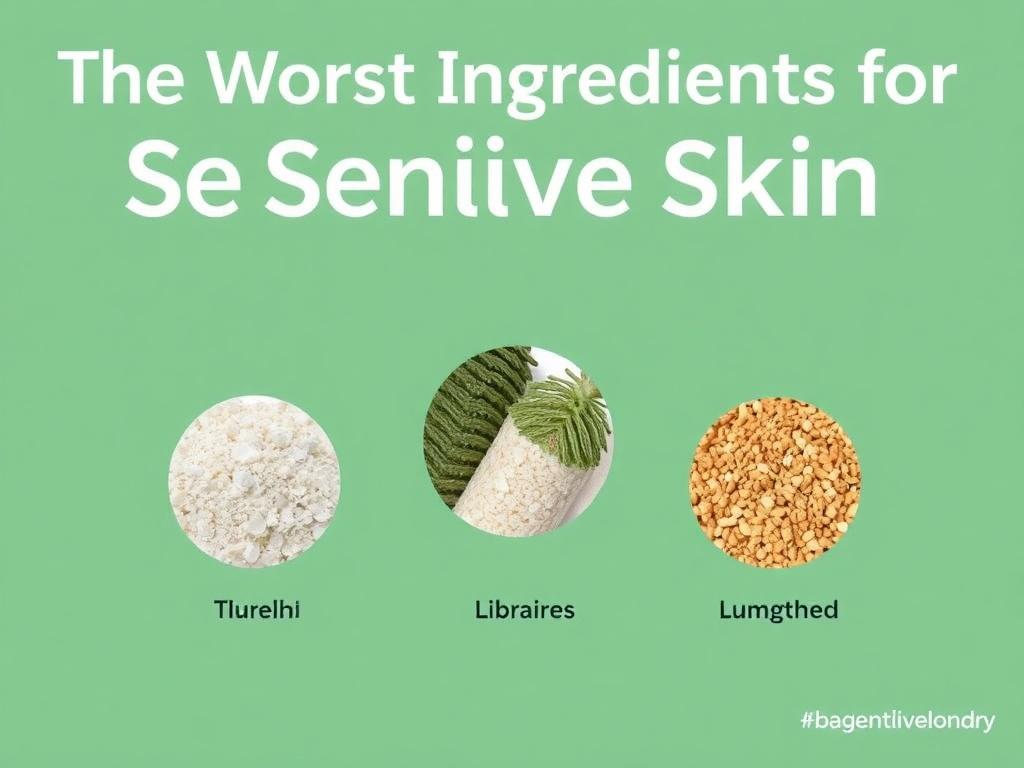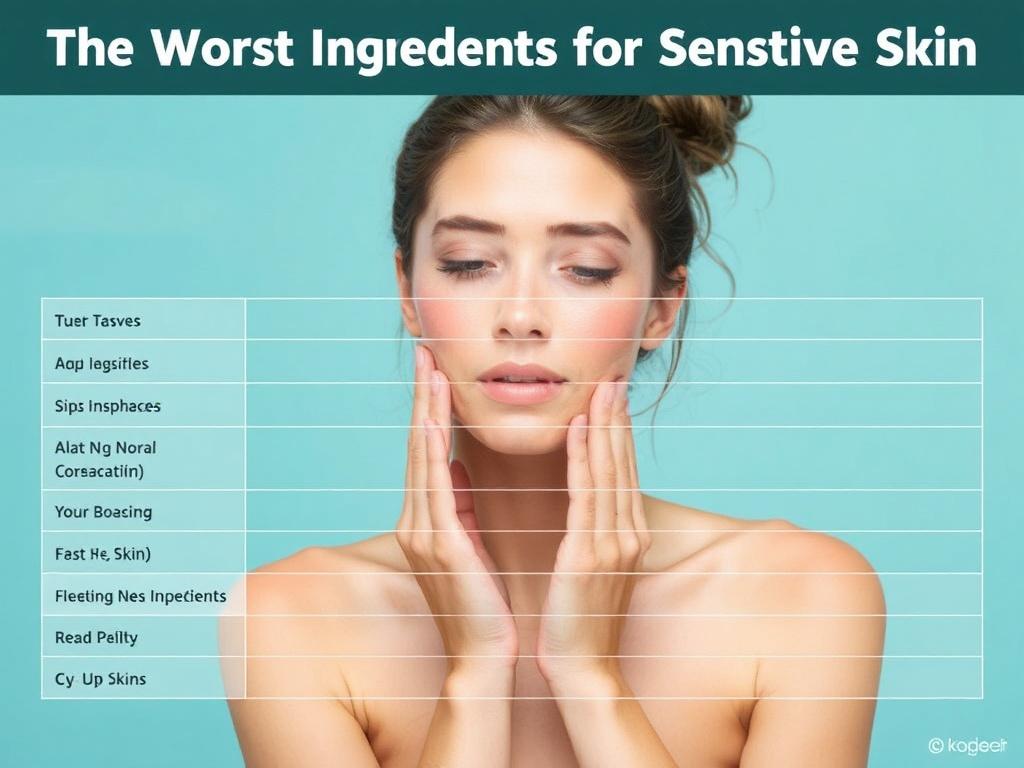Содержание статьи
- 1 Understanding Sensitive Skin: What Does It Really Mean?
- 2 Common Irritants to Avoid: The Worst Ingredients for Sensitive Skin
- 3 Summary Table: Worst Ingredients for Sensitive Skin
- 4 How to Identify and Avoid These Ingredients
- 5 Gentle Ingredients That Help Sensitive Skin
- 6 Why Some Ingredients Are Added Despite Being Harsh
- 7 Myths About Sensitive Skin and Ingredients
- 8 Final Thoughts on Sensitive Skin Care
- 9 Conclusion
Sensitive skin is a common concern that affects millions of people around the world. If you have sensitive skin, you know how frustrating it can be to find skincare products that don’t cause irritation, redness, or discomfort. The key to managing sensitive skin is knowing what ingredients to avoid. Unfortunately, many products on store shelves contain ingredients that can aggravate your skin, making it feel itchy, inflamed, or dry. In this article, we will explore the worst ingredients for sensitive skin, explain why they cause problems, and give you practical tips on choosing safer alternatives.
Understanding Sensitive Skin: What Does It Really Mean?

Before diving into the ingredients to avoid, it’s helpful to understand what sensitive skin really means. Sensitive skin isn’t a medical condition but rather a description used by people whose skin reacts more easily to environmental factors or certain products. Common symptoms of sensitive skin include redness, burning, itching, dryness, or a tight feeling. Sometimes, these symptoms appear immediately after application of a product, while other times they develop gradually over weeks or months.
The causes of sensitive skin are varied. It may be due to a thin or weak skin barrier that allows irritants to penetrate more deeply, or it may be due to certain skin conditions like eczema or rosacea. Because sensitive skin varies from person to person, what triggers a reaction can be different for everyone. But one thing remains certain: knowing the worst ingredients for sensitive skin can help you avoid unnecessary irritation.
Common Irritants to Avoid: The Worst Ingredients for Sensitive Skin
When it comes to choosing skincare products, the ingredients list is your best friend – and sometimes your enemy. Many widely used ingredients can cause irritation, especially if your skin is sensitive. Below, I will list some of the worst ingredients for sensitive skin, explaining why they can be harmful and what you should look out for.
1. Fragrances and Perfumes
Fragrances are one of the top offenders when it comes to skin irritation. While they make products smell nice, fragrances often contain a mixture of chemicals that can cause allergic reactions or exacerbate sensitive skin. Both synthetic and natural fragrances can be problematic.
In fact, “fragrance” or “parfum” listed on a label is an umbrella term for many substances that companies are not required to disclose, making it hard to know what exactly is in your product. For sensitive skin, it’s best to avoid anything with fragrance to minimize the risk of irritation.
2. Alcohols (Particularly Denatured Alcohol)
Alcohols in skincare are tricky because not all alcohols are bad. Fatty alcohols like cetyl alcohol or stearyl alcohol actually moisturize skin and are usually safe. But denatured alcohol, isopropyl alcohol, ethanol, and methanol can be drying and irritating.
These drying alcohols break down the skin’s natural oils, weakening the skin barrier and leading to more sensitivity. Products with high alcohol content can leave sensitive skin feeling tight, dry, and inflamed, especially if used frequently.
3. Harsh Exfoliants and Physical Scrubs
Exfoliation is an important step for many skincare routines, but abrasive scrubs with large, rough particles can damage sensitive skin. Ingredients like walnut shells, apricot pits, or other crunchy exfoliating agents can cause microtears in the skin, increasing irritation and sensitivity.
Gentler alternatives like chemical exfoliants with alpha hydroxy acids (AHAs) or beta hydroxy acids (BHAs) in low concentrations might be better, but even these should be used cautiously depending on skin tolerance.
4. Sulfates (SLS and SLES)
Sulfates are surfactants widely used in cleansers and shampoos to create foam and remove oils. The most common sulfates are sodium lauryl sulfate (SLS) and sodium laureth sulfate (SLES). While effective at cleansing, they are very harsh and strip away natural oils, damaging the skin barrier.
For sensitive skin, sulfates often lead to dryness, itchiness, and redness. Many sulfate-free cleansers are now available and recommended for delicate skin.
5. Parabens and Other Preservatives
Preservatives are necessary to keep products fresh and prevent bacterial growth, but some preservatives can irritate sensitive skin. Parabens, such as methylparaben and propylparaben, have been controversial for years. While many studies show they are generally safe at low levels, some people with sensitive skin find they cause reactions.
Other preservatives like formaldehyde releasers (e.g., DMDM hydantoin), methylisothiazolinone, and methylchloroisothiazolinone are more notorious for causing contact dermatitis.
6. Synthetic Dyes and Colorants
Similar to fragrances, synthetic dyes and colorants serve purely cosmetic purposes, giving products attractive hues. Unfortunately, these chemicals can irritate sensitive skin and cause allergic reactions. Avoid products with artificial colors, especially if your skin is prone to redness or inflammation.
7. Essential Oils
Though essential oils are natural, they are highly potent and can be irritating for sensitive skin. Oils like peppermint, eucalyptus, cinnamon, and clove can cause burning or allergic reactions. If you love natural products, be cautious and perform a patch test before applying them widely.
Summary Table: Worst Ingredients for Sensitive Skin

| Ingredient | Common Sources | Why It’s Bad for Sensitive Skin | Alternatives |
|---|---|---|---|
| Fragrances and Perfumes | Many skincare and cosmetic products | Cause allergic reactions and irritation | Fragrance-free or unscented products |
| Denatured Alcohol (Ethanol, Isopropyl Alcohol) | Toners, astringents, some cleansers | Dry and weaken the skin barrier | Fatty alcohols like cetyl alcohol, stearyl alcohol |
| Harsh Physical Exfoliants | Scrubs with nut shells, seeds, beads | Cause microtears and inflammation | Gentle chemical exfoliants, soft cloths |
| Sulfates (SLS, SLES) | Foaming cleansers, shampoos | Strip natural oils; cause dryness and redness | Sulfate-free cleansers |
| Parabens and Some Preservatives | Various cosmetics and lotions | May trigger allergic reactions | Preservative-free or natural preservatives like phenoxyethanol |
| Synthetic Dyes and Colorants | Colored creams, makeup products | Potentially irritating and allergenic | Products with no artificial coloring |
| Essential Oils (Peppermint, Eucalyptus, etc.) | Natural skincare and aromatherapy products | Can cause burning and allergic reactions | Use pure carrier oils or fragrance-free alternatives |
How to Identify and Avoid These Ingredients

Reading ingredient lists can be intimidating at first, especially if you don’t know what many of the terms mean. Here are some simple tips to help you avoid the worst ingredients for sensitive skin:
- Look for labels such as “fragrance-free” or “unscented.” This is a good start but read the full ingredient list because some companies still add masking fragrances.
- Familiarize yourself with common chemical names. Learn the terms for various types of alcohols, preservatives, and surfactants.
- Avoid products with long ingredient lists full of hard-to-pronounce chemicals. Simple formulas with fewer ingredients often mean a lower chance of irritation.
- Test new products on a small patch of skin. Apply a small amount on your wrist or behind your ear and wait 24-48 hours to observe reactions.
- Choose products specifically formulated for sensitive skin. These usually exclude the worst ingredients and include soothing agents instead.
Gentle Ingredients That Help Sensitive Skin
While it’s crucial to avoid harsh ingredients, enriching your skincare routine with soothing and calming components can make a big difference. Below are some gentle ingredients that are generally safe for sensitive skin and help strengthen the skin barrier:
- Aloe Vera: Known for its soothing and anti-inflammatory properties.
- Oatmeal: Helps calm redness and irritation.
- Niacinamide: A form of Vitamin B3 that reduces inflammation and strengthens skin.
- Panthenol (Vitamin B5): Moisturizes and aids skin repair.
- Ceramides: Lipids that replenish the skin’s barrier.
- Hyaluronic Acid: Provides gentle hydration without clogging pores.
Including these ingredients while avoiding the worst offenders can create a balanced, effective skincare routine for sensitive skin.
Sample Skincare Routine for Sensitive Skin
Here is a simple skincare routine that avoids the worst ingredients for sensitive skin while promoting health and comfort:
- Cleanser: Use a sulfate-free, fragrance-free gentle cream or gel cleanser.
- Toner: Opt for an alcohol-free hydrating toner with soothing ingredients like aloe vera or chamomile.
- Serum: Apply a niacinamide or hyaluronic acid serum for hydration and calming effect.
- Moisturizer: Use a fragrance-free moisturizer with ceramides and panthenol.
- Sunscreen: Choose a mineral-based (zinc oxide or titanium dioxide) sunscreen without added fragrance or dyes.
By following this routine and carefully choosing your products, you can minimize irritation and help your sensitive skin thrive.
Why Some Ingredients Are Added Despite Being Harsh
You might wonder why harmful ingredients are so common in skincare products if they cause such problems for sensitive skin. The truth is, many of these ingredients are included for specific purposes:
- Fragrances enhance the user experience by making products smell pleasant.
- Sulfates create rich lather, making products feel effective at cleansing.
- Preservatives prevent microbial growth, keeping products safe to use over time.
- Alcohols help other ingredients penetrate the skin better or provide a quick-drying effect.
While these functions are important, they often come at a cost for sensitive skin. This is why sensitive skin formulations strike a careful balance – using milder alternatives that still offer good performance without causing irritation.
How to Spot Hidden Dangers in “Natural” and “Hypoallergenic” Products
Just because a product is labeled “natural” or “hypoallergenic” doesn’t automatically mean it is free of the worst ingredients for sensitive skin. Some natural products still contain essential oils or natural fragrances that can cause irritation. Similarly, “hypoallergenic” means the product is less likely to cause allergies but does not guarantee complete safety.
Always read ingredient lists carefully, do a patch test, and watch for your skin’s reaction over several days before committing to a new product.
Myths About Sensitive Skin and Ingredients
There are many myths surrounding sensitive skin and skincare ingredients. Let’s clear up some common misconceptions to help you make informed choices:
- Myth: All alcohol is bad for sensitive skin. As mentioned, fatty alcohols are actually moisturizing and safe.
- Myth: Natural ingredients never irritate skin. Many natural ingredients like essential oils or plant extracts can cause reactions.
- Myth: Fragrance-free means no scent at all. “Fragrance-free” products may have masking fragrances to cover chemical odors.
- Myth: If a product stings a little, it’s clearing impurities. Stinging is often a sign of irritation, not cleansing.
By understanding these myths, you can avoid falling into traps and better care for your sensitive skin.
Final Thoughts on Sensitive Skin Care
Taking care of sensitive skin requires patience, knowledge, and a bit of experimentation. Identifying the worst ingredients for sensitive skin is the first step in reducing irritation and discomfort. Make sure to avoid fragrances, harsh alcohols, sulfates, parabens, abrasive exfoliants, synthetic dyes, and potent essential oils. Instead, embrace simple, gentle ingredients that nourish and protect your skin.
Remember, sensitive skin is personal; what works for one person may not work for another. Always listen to your skin’s signals and don’t hesitate to consult a dermatologist if irritation persists. With careful product choices and a mindful routine, you can enjoy a calm, healthy, and radiant complexion free from unnecessary distress.
Conclusion
Navigating the world of skincare with sensitive skin can feel overwhelming, especially when so many products contain ingredients that might cause harm. By learning the worst ingredients for sensitive skin, such as fragrances, harsh alcohols, sulfates, parabens, synthetic dyes, and aggressive exfoliants, you set yourself up for success in finding gentle, soothing alternatives that nurture your skin rather than hurt it. Always pay close attention to ingredient lists, perform patch tests, and prioritize products designed with sensitivity in mind. Sensitive skin care is a journey of trial, error, and learning—but with these insights, you can make informed choices to achieve a calm and comfortable complexion that glows with health.

